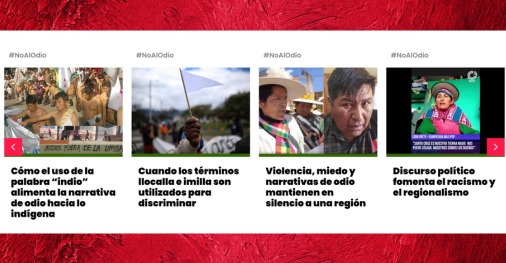The political events in Bolivia in November 2019, when President Evo Morales resigned and left the country amid accusations of electoral fraud to win a fourth term, caused a deep division in society that persists to this day.
While a segment of Bolivians believes Morales was involved in fraud trying to perpetuate himself in power, another segment believes the president was the victim of a coup d'état planned by the opposition.
In the midst of this polarization, hate speech has emerged in social networks as a tool to feed disinformation and deepen social division in Bolivia. Faced with this scenario, two fact-checking organizations seek to promote dialogue, reflection and a culture of peace through an initiative to monitor and verify hate speech.
We’re talking about Repartiendo Verdades (Spreading truth), an initiative of the non-profit organization specialized in fact-checking Bolivia Verifica, with mentoring and support from Proyecto Desconfío, the fact-checking section of the data journalism organization Datos Concepción, from Argentina. The initiative consists of using fact-checking to develop articles and graphic pieces that are then distributed through WhatsApp. It’s a way to disprove social media posts that use hate speech to create confusion towards vulnerable populations or groups.

Graphic pieces distributed through WhatsApp are based on articles developed by Bolivia Verifica after monitoring and analyzing content with hate speech. (Photo: Courtesy of Proyecto Desconfío)
"Bolivia is a rather polarized society at the moment, politically and socially. The penetration of partisan political interests has generated very, very strong tensions in society," Patricia Cusicanqui, editor-in-chief of Bolivia Verifica and coordinator of Repartiendo Verdades, told LatAm Journalism Review (LJR). "This factor has a big impact on how hatred and differences have been exacerbated. The work we have done has really helped us understand that this is not an issue we should let go unnoticed."
Repartiendo Verdades came about after receiving a “Spread the Facts" grant, awarded by the International Fact-Checking Network (IFCN) in partnership with Meta, the parent company of WhatsApp. Bolivia Verifica's proposal was the only one selected from Latin America for the program, which granted 25 thousand dollars to carry out the initiative over a period of six months.
Less than a month before the end of the project, the teams involved found that hate speech is a tool frequently used to generate information on social media. However, there is also an opposite phenomenon: the dissemination of false information about certain sectors of the population in order to increase hatred towards them.
"We have encountered both situations — hate speech in the sense of generating polarization and contempt for certain sectors or certain actors, and also the use of disinformation to foment that hatred," Adrian Pino, director of Proyecto Desconfío and coordinator of Repartiendo Verdades, told LJR. "For example, they attribute characteristics or false information to Indigenous populations regarding their practices and their communities, which are based on disinformation. The same is done to discredit women. [...] Every time there is hate speech, on many occasions there is some disinformation associated with that content."
At the beginning of the project, Pino and his team from Proyecto Desconfío trained the editorial staff of Bolivia Verifica on how to monitor and deactivate hate speech through fact-checking. The training is based on the idea that, unlike what happens with other forms of disinformation, there are legal arguments to combat hate speech on social networks, according to the guidelines established by the European Commission on Disinformation.
Based on the monitoring of hate speech on the main social media platforms, the Bolivia Verifica team analyzes the elements found and consults with specialists in human rights or politics on the repercussions that these declarations could have and who would be the main affected parties.
The team then approaches the people at whom the hate speech is directed, or their representatives in the case of communities or groups, to get their point of view. As far as possible, they also try to get in touch with the authors of hate posts.
With these inputs, they prepare articles that they publish on the initiative's website, noalodio.org. Then, based on the articles, a Proyecto Desconfío team led by designer Damián Piccoli designs a series of graphic pieces that are distributed through WhatsApp, Facebook and Twitter, along with links to the articles.
The material is sent through two distribution lists on WhatsApp: one with readers who have opted-in to receive the content, and another one with allied media and journalists. Although WhatsApp restricts the sending of content en masse, the distribution lists allow the same message to be sent to a list of up to 256 recipients. Unlike WhatsApp groups, messages in a list reach each user in an individual chat.

Journalist Patricia Cusicanqui, editor-in-chief of Bolivia Verifica, is the coordinator of the team behind Repartiendo Verdades. (Photo: Twitter @PCusicanqui)
"We set out to use a channel [that is used on a] very frequent basis to inject disinformation, such as WhatsApp, to try to reverse a little bit what had been happening. We use this tool as a way to reach audiences that perhaps are not so connected to the usual world of news, but always have WhatsApp at hand and find it a practical tool to receive information in a simple and synthesized way," Pino said. “We understood that this was an opportunity that had to be tested with an exercise of this nature.”
The Repartiendo Verdades team has noticed that much of the hate speech content is on Facebook. This is followed by Twitter and, to a much lesser extent, Instagram and TikTok. They have also noticed that the initiative's own posts on social media generate hateful comments, which Bolivia Verifica has been able to use as a guide to know where to direct its efforts.
"People tend to enter social media, see the headlines and all they do is post messages that confirm, with all this confirmation bias, their beliefs, their positions, etcetera," Cusicanqui said. "However, I think it's interesting, because you put the magnifying glass on something and you realize that it's really very worrying as a society. I think it's been an interesting experience."
Throughout the project, the Repartiendo Verdades team has learned to discern which hate speech can be combated with fact-checking and which cannot. In some cases, it is even more advisable to ignore some posts rather than give them more visibility, Pino said. Therefore, the team focuses on posts that already have some level of virality and that people are already commenting on or discussing.
"Another thing we always do is to ensure that what is going to be monitored is a statement that has real impact in the digital ecosystem. Rather than a secondary statement or one with low visibility, where we would end up giving visibility to something that didn't have it," he said. "For us, strategic silence when there is disinformation or hate speech is very relevant."
They have also learned the importance of seeking to establish a link with the sources of hate speech to give them an opportunity to respond and, if necessary, to retract. According to Pino, on several occasions political leaders who have disseminated false or misleading information have recanted when made aware that their statement includes elements of hate. For the team, regardless of whether the retraction is genuine, the simple fact of expressing it helps to make clear the existence of disinformation and hate speech.
Another lesson learned by the initiative for both newsrooms is that fact-checking can contribute to the education and media literacy of society, through informative pieces that disprove hate speech posts that people take as true and, therefore, help with their dissemination.
"There’s a need for some education. Every piece of content that one verifies has to transmit an idea of tolerance, plurality, peace, of not attacking another person because he or she thinks differently," Pino said. "I think ignorance is the main adversary. I believe that many aggressions have to do not only with bad intentions, but sometimes with ignorance, especially [when dealing with] gender issues. This is an topic that requires a lot of education."
However, Bolivia Verifica knows that the initiative alone will not succeed in educating Bolivian society. But they do hope that Repartiendo Verdades can have an impact on the possibility that people who generate and spread disinformation and hate speech will open their minds to listen to other voices. They also hope that the initiative will succeed in promoting dialogue, reflection and a culture of peace and respect for human rights.
"This project is not trying to make a change with a magic wand, but rather to promote a building process that takes time. We are working to become literate against hate speech," Cusicanqui said. “The idea is for [the publications] to be a product of consumption that is not quick, but rather that you spend some time reading them so that you can already leave with a reflection.”
Bolivia Verifica and Proyecto Desconfío are aware that WhatsApp does not offer metrics that could help them measure the impact of the material shared on the platform.

Adrian Pino, director of Proyecto Desconfío, trained the editorial staff of Bolivia Verifica on how to monitor and defuse hate speech through fact-checking. (Photo: Twitter @AdrianPino22)
However, the Repartiendo Verdades team has found other indicators of success. One of them is the subscription and retention of members on the distribution lists. As of May 2023, the initiative had 120 users to whom links and graphic pieces were sent. Another indicator is the readership levels of each message sent.
"Of course, we would love to have WhatsApp metrics and be able to say this with more numbers, see if people forward it, who they forward it to, how many times... But that's not possible, at least for now, and it's one of the blind spots we still have to monitor," Pino said. “But it gives us the feeling that WhatsApp can be a very useful channel for fact-checking projects that are monitoring these kinds of issues, because it's a place where the user is permanently connected in Latin America and uses it all day long.”
The lessons that both newsrooms have learned from Repartiendo Verdades will be compiled in a guide that will be published in June and is being developed by journalist Guadalupe López, from Proyecto Desconfío.
The document is intended to become a working guideline so that any newsroom in the region can replicate the project. The guide aims to make clear the difference involved in the verification of hate speech, which requires a special outlook, different from that of traditional fact-checking.
"This guide we are creating has the intent of saying 'Well, let's replicate these initiatives so that more people get feedback to better understand that someone who thinks differently, who is different in his or her religious, sexual, identity behavior is not a threat, but simply a person who has other insights," Pino said.
Bolivia Verifica and Proyecto Desconfío have decided to continue the work of Repartiendo Verdades beyond the expiration of the IFCN grant in June and to integrate the initiative's activities into their fixed tasks.
Among the plans to give continuity to the project is the publication of a section that compiles the graphic pieces that have been disseminated on WhatsApp. In addition, there are plans to continue with the distribution of a newsletter that was sent every 15 days since the project began, and which will be sent monthly as of June.
The newsletter aims to share the articles that come out of the monitoring and invite readers to join the distribution lists to receive the material via WhatsApp.
"I really believe that [Repartiendo Verdades] is a great contribution, not only for journalism, but also to achieve social justice. I feel that we have also put our finger on issues that people don't want to mention because it makes them uncomfortable, because it’s still taboo or because it affects their personal interests," Cusicanqui said. "We want to set a goal of [publishing] one or two articles a month, rather than abandoning it, because we’ve realized there is plenty of material, unfortunately, and I think it is important to continue talking about this."
As in other polarized environments in Latin America, the division that has developed in Bolivia has led to attacks and hostility towards members of the press who report on both sides of the political scene. According to figures from Bolivia Verifica, attacks on journalists went from one episode every six days in 2018 to one every three days in 2022.
Such hostility has made journalists one of the target groups of hate speech on social media, Repartiendo Verdades found. In May, journalist Andrés Gómez Vela, a columnist for the Rimay Pampa news outlet, was the victim of a digital harassment campaign after uncovering a corruption case involving Bolivia's Minister of Environment and Water, Juan Santos Cruz.

The articles derived from "Repartiendo Verdades" are available on noalodio.org. (Photo: Screenshot of noalodio.org)
"Journalists are the most besieged and hated groups right now in Bolivia because of political polarization, as in many countries in the region," Cusicanqui said. “Attacks on journalists in social media are [branding them as] 'sellouts,' 'corrupt,' scoundrels,' associating them with political stripes. And on the street, this translates into aggressions.”
Recent attacks on journalists in Bolivia are an example of when hate speech jumps from social media to the physical plane. Repartiendo Verdades reported in one of its issues that, in January of this year, a content creator aligned with Evo Morales' party, Movimiento Al Socialismo (Movement towards socialism or MAS), appeared in a video inviting people to burn the facilities of the Unitel media network and to "punish its journalists."
According to the report, the individual's statements gave rise to hate narratives on social media, including comments supporting the burning of the channel's facilities and aggressions against journalists.
"Especially when there are conflicts of great intensity, journalists have become — have always been, but especially now — a target of attacks. And not only verbally, but physically. Journalists have been beaten, another journalist had his car burned down while doing coverage," Cusicanqui said.